-
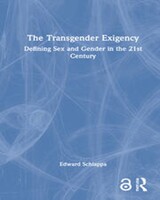
At no other point in human history have the definitions of "woman" and "man," "male" and "female," "masculine" and "feminine," been more contentious than now. This book advances a pragmatic approach to the act of defining that acknowledges the important ethical dimensions of our definitional practices.
Increased transgender rights and visibility has been met with increased opposition, controversy, and even violence. Who should have the power to define the meanings of sex and gender? What values and interests are advanced by competing definitions? Should an all-boys’ college or high school allow transgender boys to apply? Should transgender women be allowed to use the women’s bathroom? How has growing recognition of intersex conditions challenged our definitions of sex/gender? In this timely intervention, Edward Schiappa examines the key sites of debate including schools, bathrooms, the military, sports, prisons, and feminism, drawing attention to the political, practical, and ethical dimensions of the act of defining itself.
-
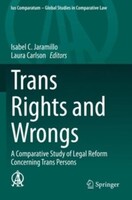
This book maps various national legal responses to gender mobility, including sex and name registration, access to gender modification interventions, and anti-discrimination protection (or lack thereof) and regulations. The importance of the underlying legislation and history is underlined in order to understand the law’s functions concerning discrimination, exclusion, and violence, as well as the problematic nature of introducing biology into the regulation of human relations, and using it to justify pain and suffering. The respective chapters also highlight how various governmental authorities, as well as civil society, have been integral in fostering or impeding the welfare of trans persons, from judges and legislators, to medical commissions and law students.
A collective effort of scholars scattered around the globe, this book recognizes the international trend toward self-determination in sex classification and a generous guarantee of rights for individuals expressing diverse gender identities. The book advocates the dissemination of a model for the protection of rights that not only focuses on formal equality, but also addresses the administrative obstacles that trans persons face in their daily lives. In addition, it underscores the importance of courts in either advancing or obstructing the realization of individual rights.
-
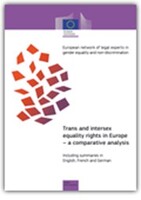
This report was drafted in 2018 by the European network of legal experts in gender equality and non-discrimination on request of the European Commission. The report analyses whether and how trans and intersex communities enjoy equality guarantees across the 28 EU Member States and three additional EFTA states (Iceland, Liechtenstein and Norway).
-
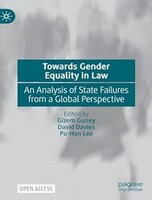
This Open Access book aims to find out how and why states in various regions and of diverse cultural backgrounds fail in their gender equality laws and policies. In doing this, the book maps out states’ failures in their legal systems and unpacks the clashes between different levels and forms of law—namely domestic laws, local regulations, or the implementation of international law, individually or in combination. By taking off from the confirmation that the concept of law that is to be used in achieving gender equality is a multidimensional, multi-layered, and to an extent, contradictory phenomenon, this book aims to find out how different layers of laws interact and how they impact gender equality. Further to that, by including different states and jurisdictions into its analysis, this book unravels whether there are any similarities/patterns in how these states define and utilise policies and laws that harm gender equality. In this way, the book contributes to the efforts to devise holistic and universal policies to address various forms of gender inequalities across the world.
-
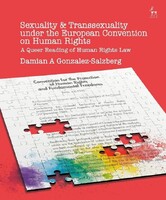
This book undertakes a critical analysis of international human rights law through the lens of queer theory. It pursues two main aims: first, to make use of queer theory to illustrate that the field of human rights law is underpinned by several assumptions that determine a conception of the subject that is gendered and sexual in specific ways. This gives rise to multiple legal and social consequences, some of which challenge the very idea of universality of human rights. Second, the book proposes that human rights law can actually benefit from a better understanding of queer critiques, since queer insights can help it to overcome heteronormative beliefs currently held. In order to achieve these main aims, the book focuses on the case law of the European Court of Human Rights, the leading legal authority in the field of international human rights law. The use of queer theory as the theoretical approach for these tasks serves to deconstruct several aspects of the Court’s jurisprudence dealing with gender, sexuality, and kinship, to later suggest potential paths to reconstruct such features in a queer(er) and more universal manner.
-
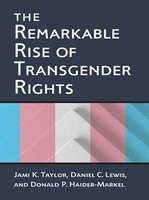
While medical identification and treatment of gender dysphoria have existed for decades, the development of transgender as a “collective political identity” is a recent construct. Over the past twenty-five years, the transgender movement has gained statutory nondiscrimination protections at the state and local levels, hate crimes protections in a number of states, inclusion in a federal law against hate crimes, legal victories in the courts, and increasingly favorable policies in bureaucracies at all levels. It has achieved these victories despite the relatively small number of trans people and despite the widespread discrimination, poverty, and violence experienced by many in the transgender community. This is a remarkable achievement in a political system where public policy often favors those with important resources that the transgender community lacks: access, money, and voters. The Remarkable Rise of Transgender Rights explains the growth of the transgender rights movement despite its marginalized status within the current political opportunity structure.
-

This book contributes to current debates about “queer outsides” and “queer outsiders” that emerge from tensions in legal reforms aimed at improving the lives of lesbian, gay, bisexual, transgender, intersex, and queer people in the United Kingdom. LGBTIQ people in the UK have moved from being situated as “outlaws” – through prohibitions on homosexuality or cross-dressing – to respectable “in laws” – through the emerging acceptance of same-sex families and self-identified genders. From the partial decriminalisation of homosexuality in the Sexual Offences Act 1967, to the provision of a bureaucratic mechanism to amend legal sex in the Gender Recognition Act 2004, bringing LGBTIQ people “inside” the law has prompted enormous activist and academic commentary on the desirability of inclusion-focused legal and social reforms. Canvassing an array of current socio-legal debates on colonialism, refugee law, legal gender recognition, intersex autonomy and transgender equality, the contributing authors explore “queer outsiders” who remain beyond the law’s reach and outline the ways in which these outsiders might seek to “come within” and/or “stay outside” law.
-
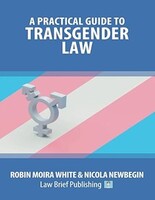
This comprehensive book has introductory sections on the facts and language related to trans, and then substantial sections on the relevant parts of the Equality Act 2010 as related to transgender individuals, and the Gender Recognition Act 2004. Specialist sections then follow, dealing with Associations, Asylum, Criminal Justice, Data Protection, Education, Employment, Family, Healthcare, Media, Name and Gender Marker Change; Politics and Parliament, Prison, Services, Sport, Gender-critical views, Example Policies and Reform.
-

While social change regarding trans(sexuality) has evolved within an expanding nexus of concepts, practices, regulations and institutions, this process has barely been analysed systematically. Against the background of legislative processes on gender recognition in a society shaped by heteronormative hegemony, Adrian de Silva traces how sexology, the law, federal politics and the trans movement interacted to generate or challenge concepts of trans(sexuality) from the mid-1960s to 2014 in the Federal Republic of Germany.
-
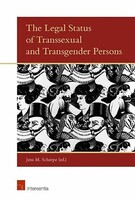
The need to allow a change of legal sex/gender in certain cases is no longer disputed in most jurisdictions. The question has therefore shifted to what the requirements for such a change of the legal sex/gender should be. This book examines these thus far under-researched questions, namely what the full legal consequences of a change of legal sex/gender should be, for example with regard to existing legal relationships such as marriages and registered partnerships, but also concerning children and parentage. This book is the result of an international research project, including not only national reports from 14 European and non-European jurisdictions but also two chapters that look at legal sex/gender changes from a Christian perspective and one chapter from a medical-psychological perspective. The final comparative chapter compares and contrasts the different approaches and requirements and makes recommendations for best practice and law reform.
-
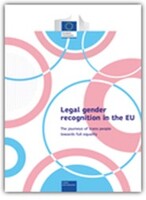
The European Commission is committed to tackling discrimination and promoting equality for transgender people. To further this objective, the European Commission’s department responsible for justice, consumer rights and gender equality (DG Justice and Consumers) commissioned and supervised this study. The research focused on the position and experiences of trans people in education, employment and later life, as well as their interactions with Legal Gender Recognition (LGR) procedures and their experiences of coming out. It also considered the impact of discrimination that trans individuals can face throughout their lifetime. Focusing on these areas, the study had two key objectives: 1) providing an overview of the situation of transgender people in the EU and 2) understanding whether there is a positive correlation between inclusive policies allowing for Legal Gender Recognition (LGR) and the well-being of transgender people. To achieve those two main objectives, the study consulted a total of 1,015 adults who identified as transgender across the 27 EU Member States and the UK, in addition to conducting a literature review, legal research and a quantitative analysis of available data. The results of these activities brought a wealth of insights into the challenges and barriers transgender people face across Europe. These formed the basis of recommendations at EU and Member State level.
-
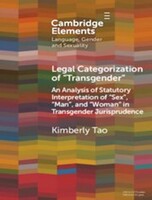
This book analyzes the foundational frame of legal reasoning when courts interpret the 'plain language' and 'ordinary meaning' of terms such as 'sex', 'man' and 'woman'. There is a rich and complicated line of cases on how to define these terms and how to legally categorize transgender people. When dealing with different legal issues, judges need to give a clear 'yes' or 'no', determinate answer to a legal question. Marginal categorizations could be problematic even for experts. The book analyses nine decisions that relate to transgender people's workplace protection under Title VII in United States and the right to marry in United Kingdom and Hong Kong. It brings in a historical discussion of the development of interpretative practices of law and legal categorization of transgender individuals across past decades, drawing on the intricate relationship between time and statutory interpretation.













